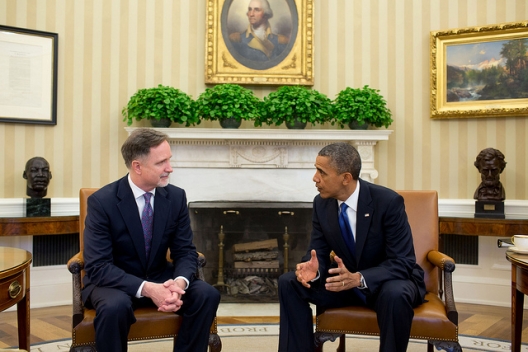 Egypt’s security, prosperity, pluralism, and its democratization remain vitally important to the United States. This was the key thrust of Ambassador Robert Stephen Beecroft’s testimony to the Senate Foreign Relations Committee on June 11, where he appeared as President Barack Obama’s nominee to become the next US ambassador to Egypt. The United States has been without an ambassador in Cairo since August 2013, following the departure of Ambassador Anne Patterson. Ambassador Beecroft, who currently serves as the US envoy to Iraq, emphasized the need to engage and partner with the Egyptian government in order to ensure that crucial US interests in Egypt are met.
Egypt’s security, prosperity, pluralism, and its democratization remain vitally important to the United States. This was the key thrust of Ambassador Robert Stephen Beecroft’s testimony to the Senate Foreign Relations Committee on June 11, where he appeared as President Barack Obama’s nominee to become the next US ambassador to Egypt. The United States has been without an ambassador in Cairo since August 2013, following the departure of Ambassador Anne Patterson. Ambassador Beecroft, who currently serves as the US envoy to Iraq, emphasized the need to engage and partner with the Egyptian government in order to ensure that crucial US interests in Egypt are met.
Among those interests cited by Beecroft were pursuing peace with Israel, countering transnational threats such as terrorism and weapons trafficking, promoting economic prosperity, and building inclusive and democratic institutions. In particular, he emphasized US security and economic interests in Egypt while describing the continuation of a strong US-Egyptian relationship as an issue of paramount importance.
In his prepared statement to the Committee, Beecroft did not mention the new government in Egypt, headed by former military chief President Abdel-Fattah al-Sisi, and refrained from mentioning Sisi’s controversial election. While he spoke about the need for a democratic and inclusive Egypt as a “crucial interest,” his statement was vague and did not refer to any major human rights problems such as the repressive protest law, police abuse, the detention of thousands of citizens on political charges, and lack of due process in the judicial system.
Questioned posed by the Committee to Beecroft touched on several issues important to US relations with Egypt, such as economic development, human rights abuses, and military aid. In discussing how the United States can promote the growth of the Egyptian economy, Beecroft stated that Egypt already possesses the fundamental building blocks for a successful economy, citing developed infrastructure, access to markets, and natural resources. He also emphasized the need for a stable, secure, and inclusive Egyptian society in order to attract foreign investment.
While Beecroft touched upon recent human rights abuses in Egypt during the question and answer portion of the hearing, his remarks were general and shied away from tough criticism, instead stating that the United States would “engage” with Sisi’s government on these matters. In response to the recent crackdown on journalists in Egypt, he remarked that it is “very disturbing and unfortunate that journalists have been detained and charged with crimes in Egypt,” and that a democratic society “cannot function effectively without freedom of the press.”
Regarding recent reports of numerous sexual assaults against Egyptian women in Tahrir Square during celebrations for Sisi’s inauguration last weekend, Beecroft expressed his concern, while also recognizing that Sisi called the acts unacceptable and called upon security forces to enforce the law and safeguard women. While he stated that the United States should continue to engage with Sisi’s government to make clear these acts are “unacceptable,” he did not provide specifics about how the United States could help ensure that the rights and freedoms of all Egyptian women are respected.
Finally, on the issue of suspended military aid, which the US administration held back last fall following the Egyptian government’s violent crackdown on the Muslim Brotherhood last summer, the Committee asked Beecroft what measures by the Egyptian government the administration would consider sufficient to meet legislatively-mandated democracy requirements for the resumption of aid. He replied that as ambassador, he would contribute to discussions regarding this issue, but said that he was not in a position to answer the question at this time.
Elissa Miller is an intern with the Atlantic Council’s Rafik Hariri Center for the Middle East.
Image: President Barack Obama meets with Robert Beecroft in the Oval Office, on September 21, 2012. (Photo: White House/Pete Souza)
